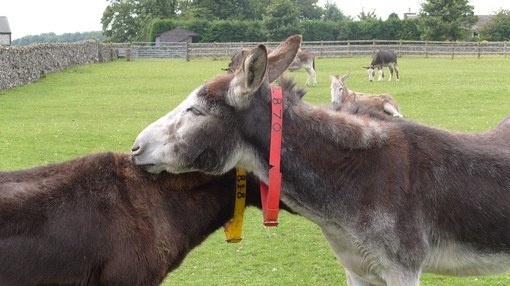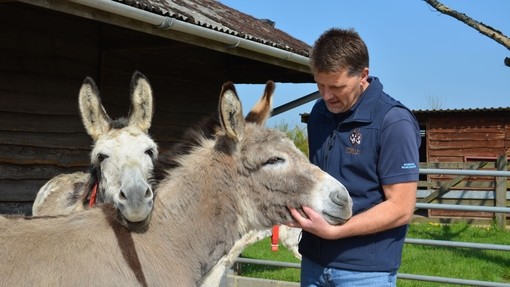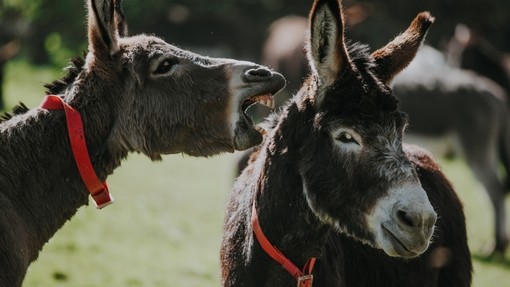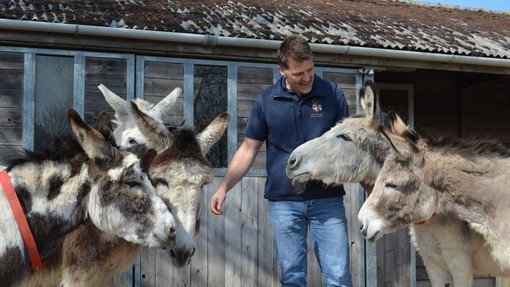Donkeys have a reason for everything they do
Their behaviour is controlled and influenced by a wide range of factors. Misunderstanding of the donkeys’ true nature and behaviour leads to the incorrect, but common belief that donkeys are stubborn. To a donkey, their behaviour is always justifiable; it is we humans who find their behaviour difficult or inappropriate.
When looking at problem behaviour, it is important to consider what benefit the behaviour provides for the donkey. Essentially, by establishing the motivation for the behaviour, the cause can be established, and by removing this cause, there will be a change in the donkey’s behaviour. When attempting to establish the causes of behaviour it is important to look at each of the areas contained in this fact-sheet and consider the possible influences of each one, on the donkey’s behaviour.
Genetics
Donkeys have certain behavioural traits which are normal for donkeys and understanding the differences in behaviour between horses, donkeys and mules is vitally important before starting any handling or training. Donkeys inherit their parents’ genes and perhaps the behavioural characteristics that go with these genes.
It is difficult to know whether behaviours are passed on in the genes or if certain behaviour is learnt from parents during the juvenile stage. The behavioural traits of the parents cause their offspring to behave in a similar way. It is important that all mares in foal are well handled to help them develop correct behaviours towards humans, which will be beneficial to their offspring. Foals should also be consistently handled correctly as they are growing up.
Environment
One of the most important elements provided by the environment is mental stimulation. Without this stimulation, problem behaviours develop; these behaviours are often designed to relieve the boredom of domestication.
Insufficient space increases the competition with herd mates for food and personal space; this in turn increases stress which can affect the temperament of the donkey. When interacting with a donkey, owners and handlers become part of the environment; therefore, changes in the behaviour of people can change the behaviour of donkeys. Any stress that is caused by the environment will be reflected in the donkey’s behaviour.
Any change in the environment or herd dynamics can change the behaviour of a donkey. Changes of normal routine can also change the behaviour of donkeys. Wherever possible, environmental changes should be made slowly and planned carefully to allow the donkey to adjust to changes without becoming stressed. Environmental enrichment is vital for domesticated donkeys.
Pain
Pain is one of the most common causes of behaviour problems in donkeys. If the donkey is in pain, it will do all it can to relieve this pain. Arthritis, back problems and other injuries can lead to kicking and refusal to have the feet lifted. If lifting the foot is painful, kicking is an attempt to have the foot placed back on the floor, therefore relieving the pain. Painful tooth growth in young donkeys can increase the incidences of chewing and nibbling in the environment or of human handlers.
Pain should always be considered if a donkey is displaying difficult or abnormal behaviour, and especially in cases of sudden changes of behaviour or if the behaviour is out of character with the donkey’s normal temperament, such as where a normally placid donkey becomes aggressive, or starts to kick. In all cases of behavioural problems it is advisable to consult your veterinary surgeon first to eliminate pain as a possible cause of behaviour change.
Medical conditions
There are numerous medical conditions that may lead to changes in behaviour or the development of problem behaviours; these include cystic ovaries, hormonal conditions, mineral and vitamin deficiencies, brain tumours, blindness, hearing loss, skin conditions, photo sensitivity and food intolerances, to name but a few. Often, these conditions are extremely difficult to identify and a vet should always be consulted to ensure an accurate diagnosis and treatment programme.
Female donkeys are likely to come into season every three weeks for four to six days and during this time it is normal for them to express a range of behaviours including aggressive or difficult behaviour as well as extremely social behaviour. These behaviours are under the influence of normal, hormonal cycles and will vary from mare to mare. It is important to remember that these hormonal cycles may not happen all year round and in the winter they often don’t occur. Keeping a daily behaviour diary for three to four months can help identify regular changes in behaviour.
Previous learning and experiences
Learning starts from the moment a donkey is born and continues throughout their life. Learning can be described as the gaining of knowledge that leads to relatively permanent changes in behaviour. Whether a foal has been socialised with other donkeys and allowed to develop correctly through the phases of juvenile development will determine whether the donkey has behavioural problems as a mature animal.
Situations that induce pain or fear will quickly teach the animal to fear people involved with such experiences.
Every time you interact with your donkey they will learn something. During learning the donkey does not consider their behaviour to be good or bad for the human, but only whether the behaviour is effective for them. Many behaviours that we consider to be problems, are in fact, not a problem for the donkey and extremely successful in creating a more comfortable or rewarding life for the animal.
Human interaction
A donkey’s behaviour will be influenced by the ability, experience and confidence of its handler. A nervous handler will increase the nervousness of the donkey. When a donkey is labelled as “difficult, naughty or bad”, the behaviour of the handler changes in accordance with the label and the animal’s behaviour will reflect how it has been labelled.
Donkeys are large, strong animals and it is normal for inexperienced handlers to lack confidence or even be fearful. Anyone intending to handle a donkey should gain as much knowledge and experience as possible, prior to commencing any behaviour training.
Training
Donkeys easily learn things that are closest to their natural behaviours. Activities, which are completely unnatural to donkeys such as being driven, ridden, holding their feet up for the farrier or travelling in a trailer, can take longer to learn because they are so far removed from the natural behaviours of the donkey.
How donkeys are trained and handled will determine their behaviour. An experienced trainer who communicates well with the donkey will help a donkey to overcome problems and learn more rapidly than a donkey with an impatient or inexperienced handler.
Before starting on a training programme or engaging the services of an equine behaviourist experienced in handling and training donkeys always consult a veterinary surgeon to eliminate any painful or medical conditions.
The science of behaviour and learning is a very large and complicated subject, and in the case of more difficult or dangerous behaviours, professional assistance should be sought before commencing training. Care should be taken when working with donkeys with behavioural problems. The handler should be confident with donkeys and take all the necessary precautions to avoid accidents.
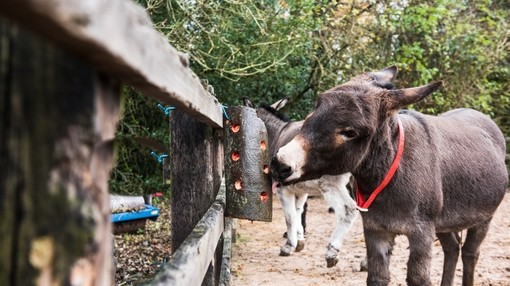
Steps to working with behaviour problems
Establish possible causes of behaviour
- Have the animal checked by a veterinary surgeon for pain or medical conditions
- Seek professional advice if you are unsure of the cause, inexperienced or the behaviour is dangerous
- Look at your own behaviour to see if that is effecting the donkey’s behaviour
- Study and research the behaviour problem, attend a Donkey Sanctuary behaviour course
- Create a shaping or training plan which will break the training it to small achievable steps
- Create a safe environment in which to work
- Accept retraining can take many months depending on the problem and the trainers ability
- Take small steps and do not rush
- Listen to the donkey’s body language; understand that they are communicating with you all the time
- Don’t give the donkey negative or derogatory labels
- Reward good behaviour as a priority
- Expect behaviour to get worse before it improves
Behaviour is a term that can be used to describe everything that an animal or human does. The science of behaviour is a vast subject, made more difficult because each animal is an individual and therefore, every behaviour is unique in the way it is formed and they way the animal exhibits it. It is important to understand that a donkey who is standing still and being stroked is exhibiting as much behaviour as a donkey that kicks when their feet are picked up.
Stubbon ass or intelligent donkey?
The nature of donkeys is not to be aggressive, stubborn or difficult but purely to learn and survive. Therefore, what is the answer to the question, are donkeys intelligent? They are good at learning to survive and they are good at learning to avoid activities they find difficult, frightening or painful. They have good memories and learn very easily. Donkeys are very good at being donkeys.
How fast can donkeys learn?
Obviously the rate of learning depends on what donkeys are trying to learn. Donkeys easily learn things that are closest to their natural behaviours. Activities, which are completely unnatural to donkeys such as being driven, ridden, holding their feet up for the farrier, or travelling in a trailer, can take longer to learn because they are so far removed from the natural behaviours of the donkey.
Their rate of learning can certainly be as quick as a dog or a dolphin, both of which are considered to be extremely intelligent animals. Anyone who owns a donkey will be aware that they quickly learn that the sound of the door latch to the feed room opening means that food may soon arrive.
They learn to control their humans very quickly, easily training them to scratch their itchy spots, or to deliver food rewards. Often, you will see donkeys reverse up to their owners because they wish to have their bottoms scratched. During this process of learning, we are seeing a donkey train its owner to scratch the appropriate spot on command – pretty clever!
Donkeys that have been well handled with positive techniques in the past are more likely to be confident and more motivated to learn new things through their interaction with humans and their environment.
In order to learn most effectively, the lessons need to be offered in small, easily understood sections or steps – this is a process we call ‘shaping behaviour’. All donkeys are individual and their ability to learn is varied. Much relies on the ability of the trainer to be able to communicate accurately and consistently what is required.
What motivates a donkey to learn?
Donkeys can be motivated most successfully by things that they would naturally find enjoyable such as food or scratches, social interaction with other animals or perhaps being turned out into a field with their companions. Not all donkeys are motivated by the same rewards, nor are they motivated to the same levels.
The use of scratches to motivate the animal is reminiscent of two donkeys mutually grooming each other and it has been scientifically shown in horses that grooming the area of the withers can lower the heart rate of the animal. However, patting a donkey is not really viewed as a positive experience by the donkey. Donkeys do not pat each other, and therefore find it difficult to understand what patting means. Patting is very similar to swatting a fly or smacking the animal, therefore it is always best to scratch the animal as a reward for good behaviour. We may like to pat our donkeys but scratching is much more appreciated by most donkeys.
The donkey can also be motivated to avoid negative stimulus such as a pull on the lead rope or negative body language. The donkey is motivated to perform the behaviour to stop or avoid something it finds negative. This type of motivation should be used carefully with full understanding of the consequences of misuse.
The negative stimulus should not be over used or increased. When it is necessary to use this type of negative stimulus to motivate the donkey, rewards should also be used to encourage the correct behaviour.
Can you teach an old donkey new tricks?
When donkeys are older or if behaviour has been established for many years it is easy to believe that their behaviour will not change. However, it certainly is possible to teach old donkeys new behaviours. Once older donkeys are mentally stimulated, by giving them problems to solve and challenges to undertake, they begin to learn new activities more rapidly. Obviously an older animal will have more established behaviour, which is harder to change, so training may take longer.
